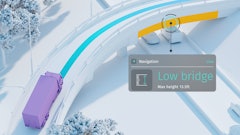Rep. Nick Rahall, the new ranking member of the House Transportation & Infrastructure Committee, blasted a measure tucked into rules changes passed by House Republicans yesterday that transportation planners fear will mean tighter budgets for transit and rail projects.
The rule reverses a 1998 policy that protected the Highway Trust Fund from cuts during the appropriations process. Transportation groups say that means the money normally protected for road and transit budgets is at risk and could even be moved around for other use. That would eliminate the long-term funding certainty that states rely on to secure contracts for large transportation projects.
Rahall called the rules change "a sad day for transportation."
"As their very first act in the majority, I find it incredible that Republicans would want to pursue a job-killing proposal like this -- one that not only threatens jobs but that could also lead to dramatic reductions in spending for very necessary and worthy highway projects throughout the nation," the West Virginia Democrat said in a news release. "Today, the new Republican majority breaks the 'trust' of the Highway Trust Fund."
A group of 21 transportation and economic groups, including the American Association of State Highway and Transportation Officials, the American Road and Transportation Builders Association and the U.S. Chamber of Commerce, sent a letter to House leadership last week opposing the rule change. AASHTO executive director John Horsley lamented the passage, saying it would hurt construction in the future.
"There are two deficits facing the country today -- the federal debt and the deficit in maintaining the infrastructure on which economic recovery depends," Horsley said. "In their zeal to address the first issue, the new House leadership has taken action that deepens the second."
At issue is a rule from former T&I Chairman Bud Shuster (R-Pa.) that essentially walled off the highway trust fund from the rest of the budget and required the federal government to spend all available revenues in the fund annually. Before the bill was passed, budget appropriators could either leave cash in the trust fund to help inflate budget numbers or redirect it elsewhere to cover gaps.
Speaking to E&E Daily reporters, Rahall said the Republicans' change was simply a "reinstitution of an old Washington smoke-and-mirrors game trying to hide the true size of the deficit."
Robert Puentes, a transportation expert at the Brookings Institution, said states could now face unexpected cuts on an annual basis. Currently, transportation dollars are appropriated through a long-term (usually six-year) bill based on projections of revenue from the federal gas tax. In the past, Congress has dipped into the general trust fund to cover any differences, but the new rule would instead allow Congress to simply lop off the difference.
"If this rule gets invoked and there's actually less money, something's going to get cut," Puentes explained. "I'm sure that's where a lot of folks are concerned. That's why guys are lining up because it's not clear whose ox will get gored."
A traditional concern has been that unexpected cuts would harm transit, bike and pedestrian projects, which traditionally played second fiddle to highways and roads. But AASHTO spokesman Tony Dorsey said there has been no indication of where states will make cuts, although the group is asking its partners to look at the impact of the new rule and project outward.
The real issue, Dorsey said, was that it removes the certainty a six-year bill is supposed to create. Because transportation projects require long-term contracts and costly construction work, the guarantee of funding for a few years allows states more flexibility.
Congress is expected to debate a new transportation reauthorization bill this spring to replace one that expired in September 2009. The trust fund will be a major issue -- because the gas tax is not indexed to inflation and has not been increased since 1993, the available funds are dwindling every year. It is estimated that there could be just $40 billion in revenue a year, far below what state transportation departments are hoping for.
Sean O'Shea, vice president of Building America's Future, said the restraints on the Highway Trust Fund could actually have a silver lining for those projects looking for alternative funding measures.
"The focus now is on instituting some good reforms, but also finding additional revenues for the Highway Trust Fund and addressing the challenges of the budget," said O'Shea, whose group advocates smarter infrastructure spending to create jobs and increase productivity. "That's where we hope a lot of the efforts are in the coming weeks and months."
For example, O'Shea said Congress could consider a national infrastructure bank outside of the trust fund to offer loans to large-scale projects. He also said states could partner more with private companies to secure financing.
Reporter Phil Taylor contributed.



















